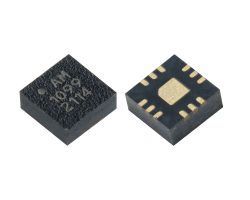26 GHz to 32 GHz Gain Block
AM1099 is a high frequency, cascadable amplifier servicing the 26 to 32 GHz frequency range. The device exhibits moderate gain and noise figure which makes the AM1099 a useful component for applications such as 5G wireless and Ka-band satcom. Packaged in a 3mm QFN with internal 50Ω matching, the AM1099 represents a compact total PCB footprint.
Evaluation board includes SMA input and output connectors and SMA voltage input unless otherwise requested. Evaluation board includes AM1099.

Products formerly Atlanta Microwave
Purpose-Built MMIC Components
Enable Portable Platforms
Leverage the latest in solid-state GaAs technology with off-the-shelf, broadband MMIC devices that operate at high frequency to enable portable and low-power platforms.
Thank you! We have received your message and will be in touch with you shortly.

